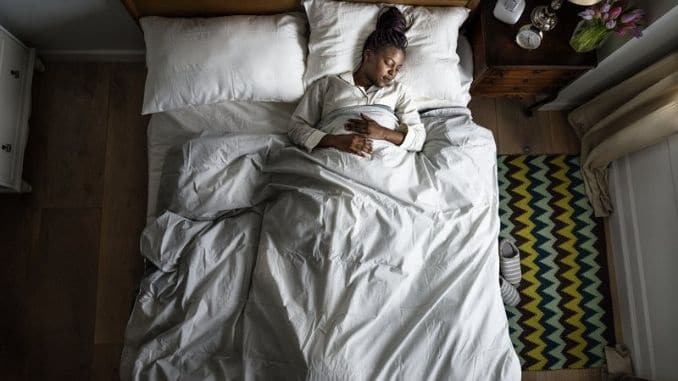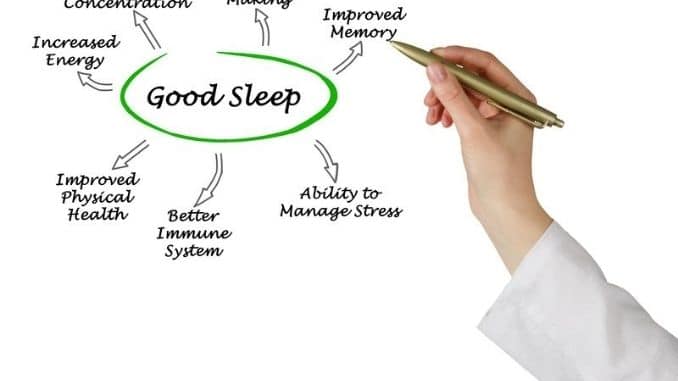
Are you getting enough sleep?
Ask people that question, and many will say they are not. The Sleep Foundation reports that over a third of adults report sleeping on average for less than the recommended seven hours per night, while almost half say they feel sleepy during the day between three and seven days per week.
The U.S. Centers for Disease Control and Prevention (CDC) agrees, stating that about a third of adults age 18 years and older get insufficient sleep. Meanwhile, the American Sleep Association notes that 50-70 million U.S. adults have a sleep disorder, with nearly 40 percent unintentionally falling asleep during the day at least once in the preceding month.
All this lack of sleep is horrible for our health. Chronic sleep deprivation has been linked to a higher risk of many of today’s most serious diseases, including type 2 diabetes, heart disease, obesity, depression, and more.

How Does Sleep Work?
Over the past couple of decades, scientists have learned a lot about sleep and how important it is too good health. It turns out that a lot more goes on while we’re sleeping than we realized.
It helps to review the stages of sleep. You see, not all sleep is the same. Every night, you cycle among four different stages of sleep. Three are qualified as non-REM (rapid eye movement) sleep and one is qualified as REM sleep.
- Stage 1 NREM: This is the transition between wakefulness and sleep. Your muscles relax and your heart rate, breathing, and eye movements slow down, as do your brain waves. Gradually, you fall asleep.
- Stage 2 NREM: Your heart rate and breathing will continue to slow and your eye movements will cease. Brain waves also remain slow. This is the longest of the sleep stages.
- Stage 3 NREM: Heart rate, breathing, and brain wave activity all reach their lowest levels, and muscles are their most relaxed. This stage plays an important role in making you feel refreshed and alert the next day.
- Stage 4 REM: This is the stage when your eyes move back and forth quickly under your eyelids. It’s the stage when dreaming occurs, and when your arms and legs become paralyzed—believed to be a protective mechanism to help prevent you from acting out your dreams and hurting yourself.
The average length of the first NREM-REM sleep cycle is 70 to 100 minutes. The second, and later, cycles are longer lasting—approximately 90 to 120 minutes. Most adults need between 7-8 hours of sleep per night. Less than that can leave you feeling tired and may eventually cause health problems, while more than that (9 hours or more) can also be unhealthy over long periods.

Why Is Sleep So Important?
You already know that a good night’s sleep can help your mind and body to recharge, but it goes a lot deeper than that.
First, it plays a critical role in your physical health. During sleep, your body goes to work repairing all the damage that it suffered during the day. It heals your heart and blood vessels, fortifies the immune system, repairs cells, synthesizes new protein and hormones, and much more.
Second, sleep is critical for brain health. During sleep, your brain sorts and stores information from the day, creating long-term memories and dumping the information you don’t need. Indeed, studies have found that sleep is critical to good memory, as, without enough of it, you’re more likely to be forgetful.
Sleep is also a detoxifying experience for the brain. According to the National Institutes of Health (NIH), during sleep, cerebrospinal fluid—a clear liquid surrounding the brain and spinal cord—moves through the brain along a series of channels surrounding blood vessels. This helps remove toxic proteins and other waste products—including the beta-amyloid protein associated with Alzheimer’s disease.
Let’s look more closely at everything that’s going on in the body and mind during sleep.

5 Ways Your Body Recovers During Sleep
1. Your brain organizes and cleans.
Sleep gives your brain a chance to process all the information it received during the day and to organize it well. Just as you may organize your files, so the brain dumps the useless information you don’t need, such as the blog you read this morning, while storing the information you do want, like the memory of your child giving you a homemade present.
This is also the time the brain gives itself a good cleaning. Just as you may dust and vacuum your office, the brainwashes itself of toxins accumulated through the day so it can start fresh the next day.
Emotions are managed during sleep too. While you’re dreaming away, your brain activity increases in areas that regulate emotion, showing that sleep is critical for emotional stability and good mental health. Indeed, a lack of sleep is connected to a higher risk of depression, anxiety, and other mental health problems.

2. Hormones flood your body.
We think of hormones as those body chemicals that control our function during the day, but they are quite active at night as well. While you sleep, your body releases hormones like melatonin, which helps you feel sleepy, while your pituitary gland releases growth hormone, which helps the body grow and repair itself.
Sleep also influences the release of hormones that play a role in your appetites, such as leptin and ghrelin. If you don’t get enough sleep, the balance of these hormones is affected, which is likely to make you hungrier the next day, to the point where you overeat. That’s why sleep deprivation is linked to a greater risk of obesity.
The sleep-wake cycle impacts glucose, as well, to where if you don’t get enough sleep, your blood glucose levels could rise, putting you at a higher risk of type 2 diabetes. According to a 2015 study, the regulation and metabolism of several hormones are impacted by sleep, such that sleep deprivation is associated with obesity, insulin insensitivity, diabetes, hormonal imbalance, and appetite dysregulation.

3. Your nerves relax.
If you’re suffering from chronic stress, try to get more sleep. During sleep, the sympathetic nervous system–which controls the stress “fight-or-flight” response—calms down. This is your chance to shed the stress of the day and allow yourself to recover.
Levels of cortisol, the stress hormone, decrease during the first two hours of sleep, then rise to peak as soon as you wake up. This is what helps you feel refreshed the next morning. Without this recovery time, the stress levels remain high, which over time, can lead to heart disease and other health issues.
4. Your immune system goes to work.
Your immune system has a night shift. While you’re sleeping, it releases cytokines, which are helpful immune cells that help your body fight inflammation, infection, and trauma. This is why getting extra sleep is so important when you’re sick or ill, as it’s during sleep that the immune system has its best chance to heal you.

5. Your blood pressure drops.
While you’re sleeping, your blood pressure goes down, meaning that your heart doesn’t have to work so hard. That gives it a chance to rest and recover and makes it easier for your cardiovascular system to function the next day. Even just one night of poor sleep can increase blood pressure the next day and has the effect of sustaining a higher blood pressure level for longer periods.

Signs You’re Sleep Deprived
You probably already know if you’re sleep-deprived, but here are the most common signs:
- Fatigue and drowsiness
- Irritability
- Mood changes
- Difficulty focusing and concentrating
- Forgetfulness
- Clumsiness
- Zoning out
- Impulsiveness
- Excess eating (particularly of high-fat and high-sugar items)
- Difficulty making decisions
- More sicknesses (more frequent cold and flu)
- Vision fatigue
- Skin problems (acne, dryness)
- Periods of micro-sleep (when you fall asleep for a few seconds)
- Reduced sex drive

How to Get a Good Night’s Sleep
If you have a chronic sleep problem, be sure to check with your doctor. Sometimes other health issues, such as sleep apnea, can cause sleep disturbances and should be treated.
If everything checks out with your health, try these tips to get a better night’s sleep:
- Get a supportive mattress. Most beds last only 5-8 years. If yours is saggy or you’re waking up with a sore back or shoulders, it’s time to go shopping.
- Keep your room cool and quiet. We sleep best in cooler temperatures and the dark. Light coming in can trigger hormones that wake you up. Use dark drapes and soundproofing, or if you sleep in a noisy area, try earplugs or a white-noise machine.
- Get outside. Sunlight affects your body clock and triggers it to wake up. Getting some exposure to sunlight helps balance your hormones and regulate your sleep-wake cycle, and can make it easier for you to sleep at night.
- Exercise regularly. Physical activity tires your muscles and also helps ease stress, which can make you feel more sleepy at night.
- Avoid stimulants before bed. These include alcohol and caffeine. Though alcohol may make you feel drowsy initially, it tends to wake you up in the middle of the night, causing more sporadic rather than deep sleep.
- Avoid late–night snacking and heavy meals. If you overload your digestive system at night, your body will have to produce more energy to metabolize all that food, which interferes with sleep. If you can’t resist snacking, choose low-calorie items that are also low in sugar and fat.
- Keep the technology out of the bedroom. Televisions, computers, tablets, and cell phones all emit artificial blue light that can trick your brain into thinking it’s daytime. This interferes with melatonin, the sleep hormone, and can keep you up at night. Stop using all of these gadgets at least 30 minutes before bed.
- Practice a before–bed routine: Take a bath, stretch, read, listen to calming music, or do something else that helps your body and mind unwind and get ready for sleep. If you do this every night, you’ll teach your brain and body to go to sleep when it’s time.

It’s clear that quality sleep is essential to healthy living, yet with today’s busy lives, it is all too often sacrificed in the pursuit of daily responsibilities. Taking the time to slow down, relax, and get the sleep your body so desperately needs is a big step towards better overall health. When you understand the tremendous impact that sleep has on your entire body, it is much easier to make downtime a priority.
Now that you better understand how important sleep is to your health, it’s time to get the rest you need! Click here to learn how to combat insomnia safely and naturally.
.

